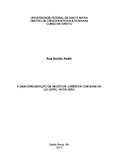| dc.contributor.advisor | Zampieri, Marcelo Carlos | |
| dc.creator | Anélli, Ana Bordin | |
| dc.date.accessioned | 2017-08-25T16:08:00Z | |
| dc.date.available | 2017-08-25T16:08:00Z | |
| dc.date.issued | 2017-07-10 | |
| dc.date.submitted | 2017 | |
| dc.identifier.uri | http://repositorio.ufsm.br/handle/1/11575 | |
| dc.description | Trabalho de conclusão de curso (graduação) - Universidade Federal de Santa Maria, Centro de Ciências Sociais e Humanas, Curso de Direito, RS, 2017. | por |
| dc.description.abstract | The addition of a single paragraph to article 116 of the National Tax Code created the socalled general antitax law (LGA). By its provisions, the fiscal authority may disregard acts and legal transactions practiced for the purpose of concealing the occurrence of the taxable event or the nature of the constituent elements of the tax obligation. Many doubts about this innovation exists: are there limits of action for the Federal Revenue? Does the absence of its regulation by ordinary law preclude its application right away? Is this law really against elision or fraud? Despite these controversial points, the Federal Revenue has been applying it, not under the total consent of the taxpayers, who make their incomings arrive until the Tax Appeals Board (CARF). In view of the foregoing, this work has the purpose of analyzing whether the general antiavoidance law is already being accepted in the disregard of legal business that are brought to this judging body. For this purpose, it identifies the history of the general antitax law in the Brazilian legal system and defines and differentiates the institutes from tax evasion and avoidance. The method of approach chosen is the dialectical one and as method of procedure the history, the comparative and the case study were selected. The conclusion is that the LGA is recognized by CARF, but its application is still cautious and based on strong evidence that there was concealment, abuse of form or law in the conduct of institutions that had their business dealings disregarded. | eng |
| dc.language | por | por |
| dc.publisher | Universidade Federal de Santa Maria | por |
| dc.rights | Acesso Aberto | por |
| dc.subject | Desconsideração de negócios jurídicos | por |
| dc.subject | Lei geral antielisão | por |
| dc.subject | Planejamento tributário | por |
| dc.subject | Disregard of legal business | eng |
| dc.subject | General anti-tax law | eng |
| dc.subject | Tax planning | eng |
| dc.title | A desconsideração de negócios jurídicos com base na lei geral antielisão | por |
| dc.title.alternative | The disregards of legal business based on the general anti-tax law | eng |
| dc.type | Trabalho de Conclusão de Curso de Graduação | por |
| dc.degree.local | Santa Maria, RS, Brasil | por |
| dc.degree.graduation | Direito | por |
| dc.description.resumo | A adição de um parágrafo único ao artigo 116 do Código Tributário Nacional criou a chamada lei geral antielisão. Por seu dispositivo, a autoridade fazendária poderá desconsiderar atos e negócios jurídicos praticados com a finalidade de dissimular a ocorrência do fato gerador do tributo ou a natureza dos elementos constitutivos da obrigação tributária. Ocorre que muitas dúvidas pairam sobre essa inovação: há limites de atuação para a Receita Federal? A ausência de sua regulamentação por lei ordinária impede a sua aplicação desde já? Essa lei é realmente antielisiva ou seria antievasiva? Apesar desses pontos controversos, a Receita Federal já a vem aplicando, não sob a anuência total dos contribuintes, que fazem chegar suas irresignações até o Conselho de Administração de Recursos Fiscais. Diante do exposto, esse trabalho tem a finalidade de analisar se a lei geral antielisão já está sendo aceita na desconsideração de negócios jurídicos que são levados até essa instância julgadora. Para isso, identifica o histórico da lei geral antielisão no ordenamento jurídico brasileiro e conceitua e diferencia os institutos da elisão e evasão fiscal. O método de abordagem escolhido é o dialético e como método de procedimento selecionouse o histórico, o comparativo e o estudo de caso. A conclusão é que a LGA é reconhecida pelo CARF, mas sua aplicação ainda se dá com cautela e com base em fortes provas de que houve dissimulação, abuso de forma ou de direito na conduta das instituições que tiveram seus negócios jurídicos desconsiderados. | por |
| dc.publisher.country | Brasil | por |
| dc.publisher.initials | UFSM | por |
| dc.subject.cnpq | CNPQ::CIENCIAS SOCIAIS APLICADAS::DIREITO | por |
| dc.publisher.unidade | Centro de Ciências Sociais e Humanas | por |


